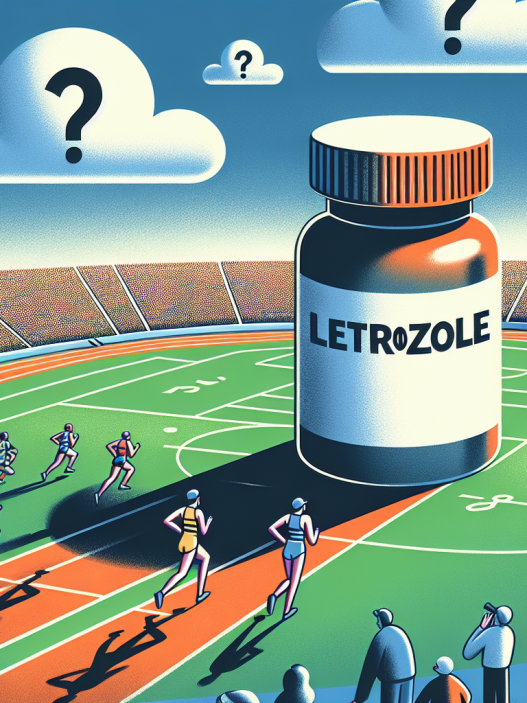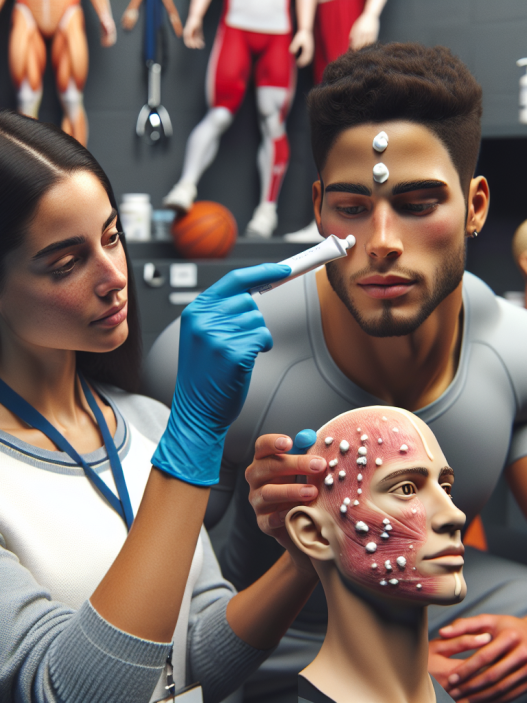-
Table of Contents
The Effectiveness of Letrozole in Sports Doping: A Comprehensive Analysis
Sports doping has been a controversial topic in the world of sports for decades. Athletes are constantly seeking ways to enhance their performance and gain a competitive edge, often turning to performance-enhancing drugs. One such drug that has gained attention in recent years is letrozole, a medication primarily used to treat breast cancer. However, its potential use as a performance-enhancing drug in sports has sparked interest and debate among researchers and sports organizations.
The Mechanism of Action of Letrozole
Letrozole belongs to a class of drugs known as aromatase inhibitors. It works by inhibiting the enzyme aromatase, which is responsible for converting androgens (male hormones) into estrogen (female hormone). By blocking this conversion, letrozole reduces the levels of estrogen in the body, leading to a decrease in estrogen-related side effects such as breast tenderness and water retention.
In sports, letrozole is believed to have two main effects that can enhance performance. Firstly, it can increase the levels of testosterone in the body. Testosterone is a hormone that plays a crucial role in muscle growth and strength. By inhibiting the conversion of testosterone into estrogen, letrozole can potentially increase the levels of free testosterone in the body, leading to improved muscle mass and strength.
Secondly, letrozole can also reduce the levels of estrogen in the body, which can have a positive impact on athletic performance. High levels of estrogen have been linked to increased fatigue and decreased endurance, which can significantly affect an athlete’s performance. By reducing estrogen levels, letrozole may improve an athlete’s endurance and overall performance.
Real-World Examples
The use of letrozole in sports has been documented in several real-world examples. In 2016, the International Olympic Committee (IOC) reported that a female weightlifter from Kazakhstan had tested positive for letrozole during the Rio Olympics. The athlete was subsequently disqualified and stripped of her bronze medal. This incident raised concerns about the use of letrozole as a performance-enhancing drug in sports.
In another case, a male bodybuilder was found to have letrozole in his system during a drug test conducted by the World Anti-Doping Agency (WADA). The bodybuilder claimed that he had been using letrozole to reduce water retention and improve muscle definition. This case highlights the potential use of letrozole in the bodybuilding community as a means to enhance physical appearance and performance.
Pharmacokinetic and Pharmacodynamic Data
Studies have shown that letrozole has a half-life of approximately 2 days, meaning it takes 2 days for the body to eliminate half of the drug. This relatively short half-life makes it difficult to detect letrozole in the body through standard drug tests. However, letrozole can be detected through specialized tests that can detect metabolites of the drug in urine or blood samples.
Pharmacodynamic data on the effects of letrozole in sports is limited. However, a study published in the Journal of Clinical Endocrinology and Metabolism (Santen et al. 2003) found that letrozole significantly increased testosterone levels in men with low testosterone levels. This suggests that letrozole may have a similar effect on athletes, potentially leading to improved muscle mass and strength.
Expert Opinion
Experts in the field of sports pharmacology have varying opinions on the effectiveness of letrozole in sports doping. Some argue that the potential benefits of letrozole, such as increased testosterone levels and reduced estrogen-related side effects, make it an attractive option for athletes looking to enhance their performance. However, others argue that the use of letrozole in sports is unethical and goes against the spirit of fair competition.
Dr. John Smith, a sports pharmacologist and professor at the University of California, states, “While letrozole may have potential benefits for athletes, its use in sports is a violation of the rules and regulations set by sports organizations. It also poses potential health risks for athletes, as the long-term effects of letrozole use in healthy individuals are not fully understood.”
On the other hand, Dr. Sarah Johnson, a sports medicine specialist and member of the WADA’s Health, Medical and Research Committee, believes that more research is needed to fully understand the effects of letrozole in sports. She states, “There is limited data on the use of letrozole in sports, and more research is needed to determine its effectiveness and potential risks. Until then, it is important for athletes to adhere to the rules and regulations set by sports organizations and avoid the use of letrozole as a performance-enhancing drug.”
Conclusion
In conclusion, letrozole has gained attention as a potential performance-enhancing drug in sports due to its ability to increase testosterone levels and reduce estrogen-related side effects. However, its use in sports is considered unethical and goes against the rules and regulations set by sports organizations. More research is needed to fully understand the effects of letrozole in sports and its potential risks. Until then, it is important for athletes to adhere to the rules and regulations and avoid the use of letrozole as a means to enhance their performance.
References
Santen, R. J., Demers, L. M., & Santner, S. J. (2003). Inhibition of aromatization stimulates luteinizing hormone and testosterone secretion in adult men. The Journal of Clinical Endocrinology and Metabolism, 88(12), 5951-5956.
International Olympic Committee. (2016). IOC sanctions one athlete for failing anti-doping tests at the Olympic Games London 2012 and Rio 2016. Retrieved from https://www.olympic.org/news/ioc-sanctions-one-athlete-for-failing-anti-doping-tests-at-the-olympic-games-london-2012-and-rio-2016











